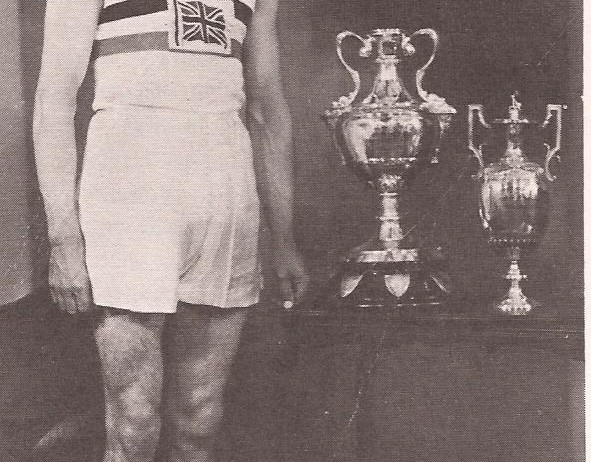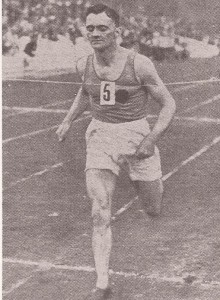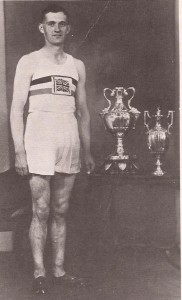Robert Graham, born 4th August 1909, started his career with Motherwell YMCA but spent most of it as a Maryhill Harrier. Winner of four SAAA Mile titles, setter of four native records at different distances and competitor in the 1934 Commonwealth Games and 1936 Olympics, his career really took off in 1932 at the Glasgow Transport Sports at Helenvale in Glasgow where he set a Scottish record for the 880 yards of 1:55.8. The Helenvale meeting was a big one and continued right up to the 1960’s and was noted for being quite a fast track. The Glasgow Herald of 17th August, 1932, reported the race as follows:
“Scottish Half Mile Record Broken: The sports meeting of the Glasgow Transport Club, held at Helenvale Park last night in dull weather and before a good attendance, saw the Scottish native half-mile record broken by a large margin. This took place in one of the heats of the half-mile which had been specially handicapped for the occasion. In this, R Graham of Motherwell had been handicapped to receive three yards from WH Calderwood, the Scottish champion. The Motherwell youth, however, elected to run from scratch. Calderwood was always within striking distance and the pair were 15 yards away from the leaders at the bell. Two hundred yards from home, the pair were out alone and a ding-dong struggle ensued. Calderwood closed with Graham entering the home straight and looked a winner, but the Motherwell man came again in the last 30 yards to win by the barest of margins in 1 min 55 4-5th secs, two seconds faster than CB Mein’s record established in 1925. It was a memorable race and the loser has to be commiserated with as he was also well within the record.
Graham covered the distance a week ago in the same time off five yards, so that last night’s performance was excellent because the conditions were not so good. Graham has made a remarkable progress during the past season as a year ago at the Rangers meeting he was third in the Mile off the 120 yard mark. It was easily the best half-mile in Scotland and Graham’s time was only 2-5th sec outside the Scottish all-comer’s record.”
give the newly crowned Scottish champion Calderwood a shot at the record: he was clearly in form to get it as his run showed. But to give any man 3 yards in a handicap over 880 yards is a bit of an insult as it just sets him up as a pacemaker. The race is important not only for the record but also because it shows that Graham was not afraid to go it alone from the front but was not one to give in, finishing with his burst over the last 30 yards. It brought him to the fore, as they might have said in 1932. He stayed with the event the following year when he was third – “Graham ran his usual plucky race although over weighed by the winner’s pace at the finish.”
In 1934 Tom Riddell was unable to attend the Empire Games in London and Graham was called in. He was fifth in the Final with the first three being Jack Lovelock (4:12.8), Sydney Wooderson, Jerry Cornes. He liked the cinder track at Helenvale because on 20th August 1935 he set a Scottish record for the Mile of 4:12. Not only was it a Scottish record, it was also a British one – Wooderson had just improved Reg Thomas’s GB time when he ran 4:12.7 17 days earlier. It was no real surprise because three weeks earlier he had beaten Riddell’s three quarter mile record with a time of 3:04.6. These were quite outstanding performances on cinder tracks, at a time when training theory was in its infancy and when the kit available to even the most modest modern athlete was not available. Two days after the record mile, the Glasgow Herald had a note saying that Graham had been selected to run at the Jubilee International where Scotland & Ireland were up against England & Wales at the White City, as a replacement for Tom Riddell who was unable to attend. The race was on Saturday, 24th August and the headline in the paper the following Monday read “Maryhill Runner’s Fine Victory” and read “One of the best races was in the mile when in a desperate finish Robert Graham, the 20-year old Maryhill runner who recently equalled Jack Lovelock’s British record, beat AV Reeves by six yards. Graham was always with the leaders and in spite of a persistent challenge from Reeve he managed to gain first place.” John Keddie in the official centenary history of the SAAA says that this was his most outstanding victory.
1936 was Olympic year and Graham was obviously well in the frame for selection after his superb season in 1935. The SAAA Championships were held on 27th June at Hampden Park and he won in a new championship best of 4:12.5. The race was notable for the duel between Graham and JC Stothard the half-miler. The report read:
“SAAA Championships: Graham’s fast time in the Mile. One of the most memorable and yet the most easily won event of the afternoon’s sport was the mile, which fell to Robert Graham of Maryhill Harriers – a title vacated by the indomitable Tom Riddell. Interest in this event was intensified by reason of the two star contenders, one of whom was JC Stothard who relinquished his half-mile title in order to have a crack at Graham over the mile.
Over the first quarter of a mile a clubmate of Graham, R Osborne, set a merry pace clocking 60 sec with Graham almost 8 yards behind and Stothard lying handy behind Graham. At the close of the half mile stage, Graham took the lead timed at 2 min 6 5-10th sec and here the impression was gained that Stothard was none too happy. Stothard was still nursing Graham at the three-quarter mile mark in 3 min 11 8-10th sec. Graham increased his pace, compelling Stothard to extend himself much more than he could stand to retain his natural poise and balance. Piling on pace, Graham opened up a perceptible gap at the 300 yards mark, and from that point Stothard was hopelessly beaten in a race which was a great tactical victory for Scotland’s greatest miler and now, by common consent, one of Britain’s representatives at the Olympic Games.
The time of 4 min 12 5-10th sec has only been beaten once in Scotland, and that by himself, and his 4 min 12 sec of last season stood as a British record until only the other day when SC Wooderson broke it in the Southern Championships. Note the quarter mile times of this race – 61 sec, 65 5-10th, 64 7-10th, 61 3-10th. Graham can easily improve on his second lap without impairing the time of the final lap, because Graham took time to take a glance round as he entered the home straight, reserve which may be suitably distributed in a more even schedule of running.”
That was the victory and it won him the Crabbie Cup, awarded annually to the most meritorious performance of the SAAA Championships. He followed this performance with a third place in the AAA’s championship and was selected for the Berlin Olympics. Unfortunately, like Sydney Wooderson, he failed to qualify for the Final leaving Cornes as the only British finalist.
In June 1937 he retained his SAAA title and the Glasgow Herald said: “Graham’s Confidence. Fears that Robert Graham might have trained off slightly were shattered when without the inspiration of company, he retained the mile championship in 4 min 19 1-4th sec. From the pistol he ran absolutely alone and, making his own pace, beat PJ Allwell (Beith) by 60 yards. There was no sign of sluggishness in his running and his striding was faultless.”
He travelled to the AAA’s championship where he was third in the mile, won by Wooderson in 4:15.9. Later that year he set a Scottish Two Miles record of 9:17.3 and ran his fastest 1500m in Helsinki with 3:56.4 in early September. He made it three SAAA titles in in a row in 1938 when the report read “Until the last lap of the mile, many of the spectators thought that Jack Gifford of Bellahouston would menace Robert Graham’ prospects of retaining his title but it was obvious that Graham in the lead and confident enough to remain there had something in reserve, and when the champion did make his effort he drew clear steadily and won by five yards. Graham finished comfortably, glancing back over his shoulder repeatedly – a habit of which he has not managed to rid himself.”
This was only the second time in the reports that I have read that the backward glance has been mentioned: it should be noted that there are at least two types of backward glance – there is the anxious look back of the weary athlete who is desperate for the line to come but fears that it may not, and there is the backwards glance of the winning athlete who is quite confident and merely checking the situation out. I suspect that in this case it would be the latter.
He retained the championship in 1939 but there was no report on his race in the newspaper although the meeting was covered. He had had an excellent career as a track runner and his championship best for the mile lasted until broken by Alex Breckenridge of Victoria Park in 1953 and his three-quarter mile record lasted even longer, until 1959 when Graham Stark of Edinburgh Southern Harriers took it from 3:04.6 to 3:02.5.


